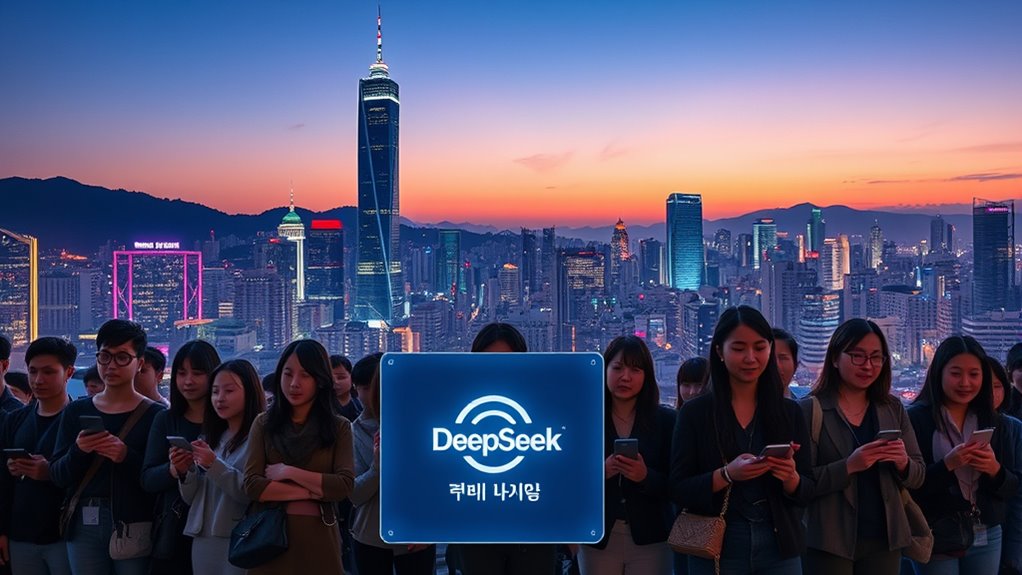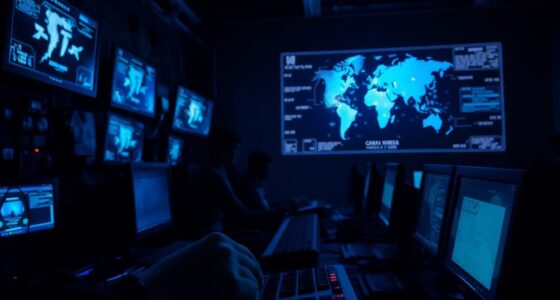South Korea's suspension of DeepSeek over data privacy issues serves as a wake-up call for nations worldwide. If you're concerned about user data protection, you should pay close attention to how this impacts AI governance. With other countries following suit, the pressure's on to establish stringent regulations. This situation reveals the vital link between compliance, user trust, and innovation in AI. Want to understand the deeper implications? There's much more to explore in the evolving landscape of AI regulations.

As concerns over data privacy escalate, South Korea's Personal Information Protection Commission (PIPC) has suspended new downloads of DeepSeek, a popular AI tool that had amassed over 1 million weekly users. This move highlights serious regulatory scrutiny facing the platform, which has garnered attention for its advanced AI capabilities at a fraction of the cost of similar models in the U.S. However, the excitement surrounding DeepSeek comes with significant risks, particularly regarding user data and privacy.
Users like you might be wondering why this suspension matters. It's not just South Korea; other countries such as Australia, Taiwan, and Italy have also imposed restrictions on DeepSeek due to similar data privacy concerns. The situation underscores a growing global trend where nations are reevaluating their approach to data privacy and AI governance.
The suspension of DeepSeek reflects a global trend in reevaluating data privacy and AI governance across nations.
In South Korea, the PIPC aims to ensure that companies comply with data protection laws, and DeepSeek's failure to adequately address content moderation and data security protocols has raised alarms. With major South Korean firms like Kakao Corp and SK Hynix limiting access to generative AI services, it's clear that the impact is widespread. The suspension of DeepSeek will continue until compliance with the Personal Information Protection Act (PIPA) is achieved.
Even financial institutions have banned DeepSeek on various networks, reflecting deep-rooted fears about user data handling and security. You might find it hard to believe that a tool with such a vast user base could face such drastic measures, but the reality is that the potential for misuse of personal data is a pressing concern.
As you consider the implications of these actions, think about the broader picture of global AI governance. Countries are increasingly recognizing the need for international standards to manage the risks associated with AI technologies. DeepSeek must navigate these turbulent waters carefully to regain its footing in South Korea.
Without compliance and transparency, the platform risks losing its competitive edge and user trust. The situation is also a wake-up call for tech companies worldwide. With DeepSeek's innovative capabilities, other nations may feel pressure to elevate their own AI technologies.
But unless they prioritize user data protection, they could face similar fates. It's a critical juncture for AI development, and the decisions made today will shape the landscape for years to come. If you're a DeepSeek user or an observer of the tech sector, this moment is one to watch closely.
Conclusion
As South Korea's AI strike reverberates, it's a clarion call for nations to awaken from their slumber. Ignoring the power of AI is like standing on the edge of a storm, oblivious to the winds that promise change. DeepSeek's innovations are not just ripples in a pond; they're waves that could reshape the shore. Embrace this tide, or risk being swept away, lost in the depths of technological oblivion. The future's here; don't let it pass you by.









